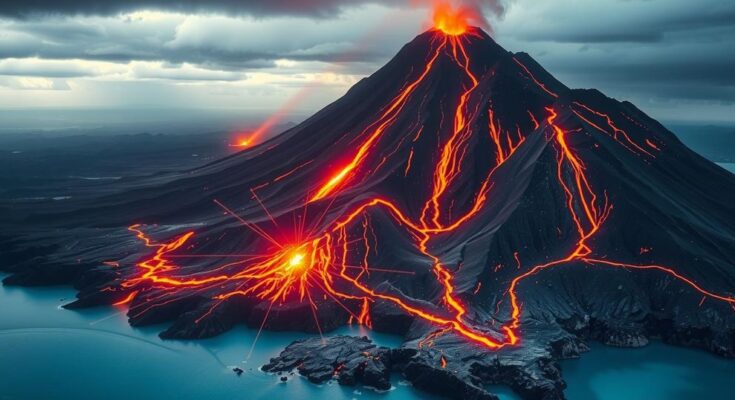Experts warn that the next massive volcanic eruption could have catastrophic effects on global climate, potentially mirroring the historical impact of Mount Tambora in 1815. With climate change affecting atmospheric dynamics, scientists estimate a 1-in-6 chance of such an eruption occurring this century, highlighting the need for improved preparedness and mitigation strategies.
The looming threat of a massive volcanic eruption poses a significant risk to contemporary society. Drawing lessons from history, the overwhelming eruption of Mount Tambora in 1815 dramatically altered global climate conditions, leading to widespread agricultural failure and societal upheaval. As climate experts predict a comparable event in the future, the ramifications for a world already grappling with climate change could be catastrophic. The potential for another substantial eruption, such as those in historically active regions, exists, raising urgent questions about preparedness and mitigation strategies.
According to Markus Stoffel, a climate professor at the University of Geneva, “The question is not if, but when” a massive eruption will occur. Geological assessments estimate a 1-in-6 chance of such an event within this century. The intertwined relationship between volcanoes and climate is complex; while eruptions can release greenhouse gases, scholars emphasize the significant cooling impact from sulfur dioxide emissions. This gas, when propelled into the stratosphere, forms aerosol particles that reflect sunlight, potentially cooling the planet by 1 to 1.5 degrees Celsius, as evidenced by previous eruptions including Tambora and Mount Pinatubo.
Today’s world, however, is markedly different. Scientists assert that a warmer climate could amplify the cooling effects of an eruption. The alteration in atmospheric dynamics means aerosols would not only spread more rapidly but could also be more effective in scattering sunlight. Furthermore, current climatic conditions, including melting glaciers and increased rainfall, may exacerbate volcanic activity by reducing pressure on magma reserves, making the earth more volatile.
Nevertheless, any potential cooling resulting from volcanic eruptions would be transient. Experts warn that the immediate consequences could devastate populations living near active volcanoes and disrupt global food security through altered weather patterns. In the longer term, the economic toll could surpass tens of trillions due to agricultural losses and infrastructure damage. Presently, experts advocate for comprehensive planning to address these challenges, highlighting the necessity for proactive measures and risk assessments to ensure societal resilience to imminent volcanic threats.
Historically, volcanic eruptions have had profound impacts on the climate and societies. The catastrophic eruption of Mount Tambora, noted as the most powerful eruption in recorded history, serves as a critical reference point for understanding the potential future risks associated with similar volcanic events. With geological evidence indicating that the next significant eruption may be imminent, it is crucial to analyze the combined effects of such an event on a world already experiencing significant climatic changes, particularly due to anthropogenic influences.
In summary, the potential for a massive volcanic eruption poses a serious threat to global stability, especially in the context of ongoing climate change. With experts predicting a significant eruption within this century, the world must prioritize preparation strategies to mitigate impacts on human populations, economies, and food security. Acknowledging the inherent risks and adopting a proactive approach will be vital in ensuring the resilience of societies in the face of this geological menace.
Original Source: www.cnn.com




